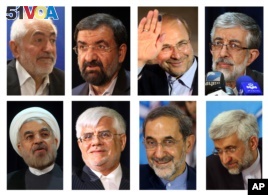June 12,2013
LONDON — Iran holds elections Friday to decide on a successor for President Mahmoud Ahmadinejad. Analysts say his replacement will take charge of a country that is increasingly isolated both in the region and internationally.
Syria's brutal civil war forms the regional backdrop for Iran's presidential election.
Analysts say the recent fall of the town of Qusair to Syrian government forces - aided by their Hezbollah allies from Lebanon - reveals Iran's hand in the conflict.

A combination of eight pictures shows the eight candidates approved for Iran's June 14 presidential election. (Clockwise from L) Mohammad Gharazi, Mohsen Rezaei, Mohammad Bagher Qalibaf, Gholam Ali Haddad Adel, Hasan Rowhani, Mohammad Reza Aref, Ali Akbar
Hazhir Temourian, a Middle East analyst who lives in Britain, said Hezbollah forces are an Iranian proxy.
"The fact that there are apparently thousands of Hezbollah fighters fighting on the side of the Syrian government against the rebels, that means Iranian involvement. But on top of that there's been a huge amount of armament and money as well," Temourian said.
But Iranian support for Syria will remain whoever wins the next election, said analyst Shashank Joshi of the London-based Royal United Services Institute.
"Iran sees the struggle inside Syria as near existential," Joshi explained. "And they see the potential for Bashar al-Assad as representing only the first step on a broader attack against Iran.
Joshi said that in reality, Iran's supreme leader Ayatollah Ali Khamenei directs foreign policy.
"The most we can hope for is that a loyalist president, someone like Saeed Jalili, are maybe given more control of these issues if he's trusted in a way that Mahmoud Ahmadinejad wasn't," Joshi said.
Jalili - currently Iran's chief nuclear negotiator - said last month that the country is ready to resume talks over its nuclear program. The West believes Iran is trying to build atomic weapons - a charge Tehran denies - and has imposed severe economic sanctions.
The new Iranian president will inherit a country that is increasingly isolated, noted analyst Temourian.
"Apart from the Hezbollah who are very, very expensive to sustain, the Iranians have almost no friends in the world. Their friends are smugglers, people who make money out of buying surreptitiously their oil against international sanctions," he said.
The sanctions drove President Ahmadinejad to seek new allies in Africa. In April he visited uranium producer Niger - but came away without any big trade deals.
Iran has also forged bonds with leftist Latin American countries - and was the first to send condolences on the death of former Venezuelan President Hugo Chavez in March.
Last month Iran's oil minister visited India to try to revive sales of crude, which last financial year plunged by over a quarter.
"The one hope for Iran in the longer term might be, if sanctions harden into a long term, crushing apparatus of containment, they might find sympathy amongst the non-aligned nations, including countries like India," Joshi said.
Analysts say that for now, the grip of Western sanctions - and the guiding hand of the Ayatollah - mean that Iran's new president will find little room to maneuver on the global stage.